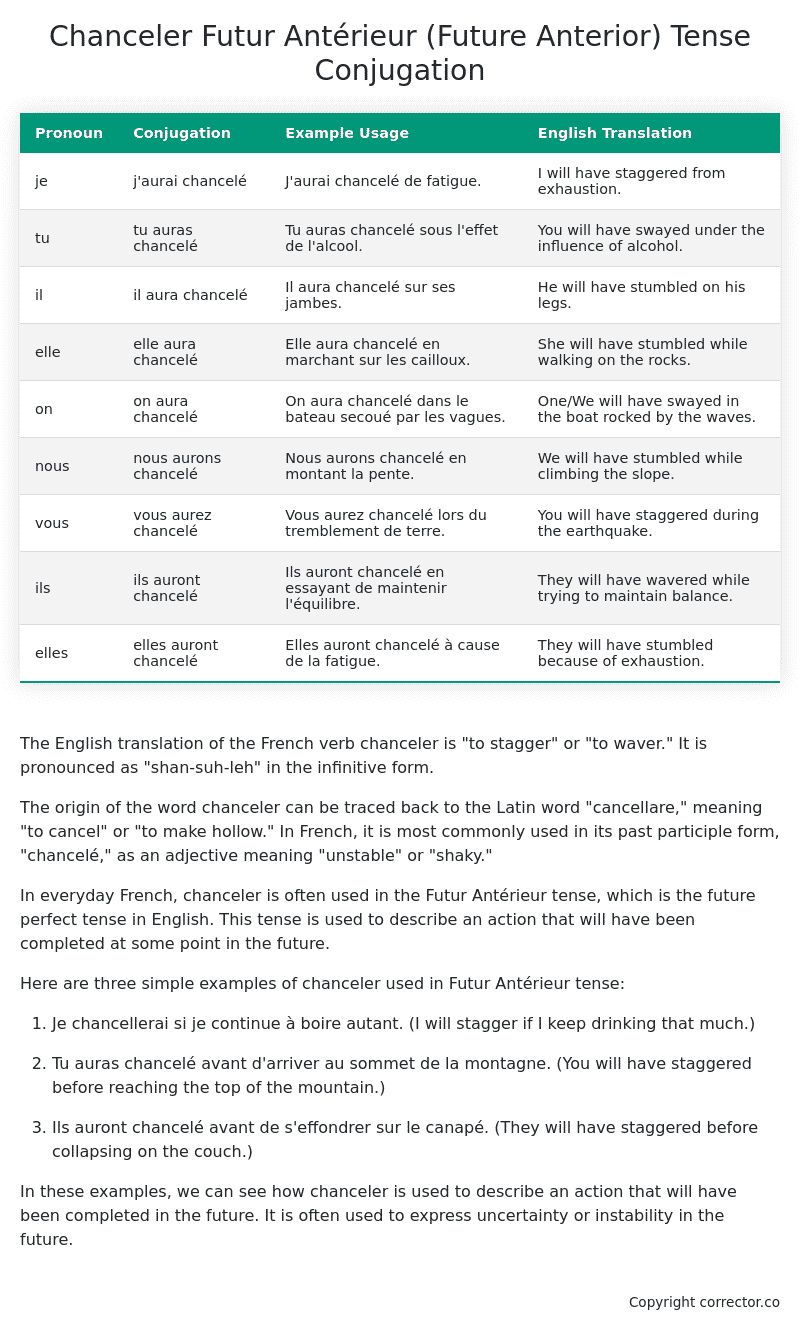Futur Antérieur (Future Anterior) Tense Conjugation of the French Verb chanceler
Introduction to the verb chanceler
The English translation of the French verb chanceler is “to stagger” or “to waver.” It is pronounced as “shan-suh-leh” in the infinitive form.
The origin of the word chanceler can be traced back to the Latin word “cancellare,” meaning “to cancel” or “to make hollow.” In French, it is most commonly used in its past participle form, “chancelé,” as an adjective meaning “unstable” or “shaky.”
In everyday French, chanceler is often used in the Futur Antérieur tense, which is the future perfect tense in English. This tense is used to describe an action that will have been completed at some point in the future.
Here are three simple examples of chanceler used in Futur Antérieur tense:
-
Je chancellerai si je continue à boire autant. (I will stagger if I keep drinking that much.)
-
Tu auras chancelé avant d’arriver au sommet de la montagne. (You will have staggered before reaching the top of the mountain.)
-
Ils auront chancelé avant de s’effondrer sur le canapé. (They will have staggered before collapsing on the couch.)
In these examples, we can see how chanceler is used to describe an action that will have been completed in the future. It is often used to express uncertainty or instability in the future.
Table of the Futur Antérieur (Future Anterior) Tense Conjugation of chanceler
| Pronoun | Conjugation | Example Usage | English Translation |
|---|---|---|---|
| je | j’aurai chancelé | J’aurai chancelé de fatigue. | I will have staggered from exhaustion. |
| tu | tu auras chancelé | Tu auras chancelé sous l’effet de l’alcool. | You will have swayed under the influence of alcohol. |
| il | il aura chancelé | Il aura chancelé sur ses jambes. | He will have stumbled on his legs. |
| elle | elle aura chancelé | Elle aura chancelé en marchant sur les cailloux. | She will have stumbled while walking on the rocks. |
| on | on aura chancelé | On aura chancelé dans le bateau secoué par les vagues. | One/We will have swayed in the boat rocked by the waves. |
| nous | nous aurons chancelé | Nous aurons chancelé en montant la pente. | We will have stumbled while climbing the slope. |
| vous | vous aurez chancelé | Vous aurez chancelé lors du tremblement de terre. | You will have staggered during the earthquake. |
| ils | ils auront chancelé | Ils auront chancelé en essayant de maintenir l’équilibre. | They will have wavered while trying to maintain balance. |
| elles | elles auront chancelé | Elles auront chancelé à cause de la fatigue. | They will have stumbled because of exhaustion. |
Other Conjugations for Chanceler.
Le Present (Present Tense) Conjugation of the French Verb chanceler
Imparfait (Imperfect) Tense Conjugation of the French Verb chanceler
Passé Simple (Simple Past) Tense Conjugation of the French Verb chanceler
Passé Composé (Present Perfect) Tense Conjugation of the French Verb chanceler
Futur Simple (Simple Future) Tense Conjugation of the French Verb chanceler
Futur Proche (Near Future) Tense Conjugation of the French Verb chanceler
Plus-que-parfait (Pluperfect) Tense Conjugation of the French Verb chanceler
Passé Antérieur (Past Anterior) Tense Conjugation of the French Verb chanceler
Futur Antérieur (Future Anterior) Tense Conjugation of the French Verb chanceler (this article)
Subjonctif Présent (Subjunctive Present) Tense Conjugation of the French Verb chanceler
Subjonctif Passé (Subjunctive Past) Tense Conjugation of the French Verb chanceler
Subjonctif Imparfait (Subjunctive Imperfect) Tense Conjugation of the French Verb chanceler
Subjonctif Plus-que-parfait (Subjunctive Pluperfect) Tense Conjugation of the French Verb chanceler
Conditionnel Présent (Conditional Present) Tense Conjugation of the French Verb chanceler
Conditionnel Passé (Conditional Past) Tense Conjugation of the French Verb chanceler
L’impératif Présent (Imperative Present) Tense Conjugation of the French Verb chanceler
L’infinitif Présent (Infinitive Present) Tense Conjugation of the French Verb chanceler
Struggling with French verbs or the language in general? Why not use our free French Grammar Checker – no registration required!
Get a FREE Download Study Sheet of this Conjugation 🔥
Simply right click the image below, click “save image” and get your free reference for the chanceler Futur Antérieur tense conjugation!

Chanceler – About the French Futur Antérieur (Future Anterior) Tense
Construction
Common Everyday Usage Patterns
Interactions with Other Tenses
For example
Summary
I hope you enjoyed this article on the verb chanceler. Still in a learning mood? Check out another TOTALLY random French verb conjugation!


